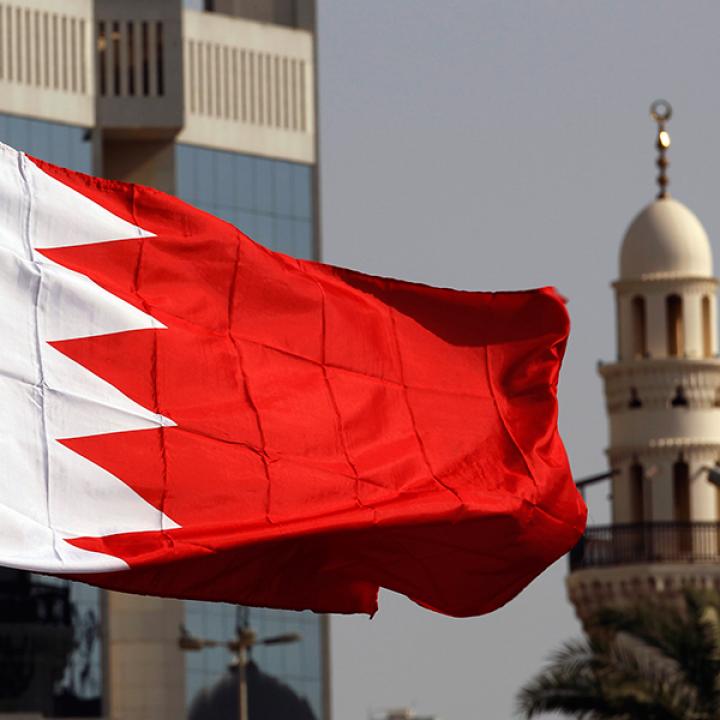
- Policy Analysis
- Policy Alert
Bahrain’s Hopes and Fears for the Peace Conference

Although the island may reap diplomatic kudos and economic benefits for hosting such a high-profile event, the potential reactions of domestic sectarian communities and nearby Iran remain a concern.
The “Peace to Prosperity” workshop being held in Manama on June 25-26 represents a considerable success for the Gulf island state. Bahrain lacks the oil wealth of some of its neighbors and has been overtaken in the business world by Abu Dhabi, Dubai, and Qatar, but hosting a discussion on the economic facets of Middle East peace gives it a claim to the major leagues.
As the only Gulf Arab state with an integrated, indigenous Jewish community (however small), Bahrain is arguably a more natural partner for Israel than either Saudi Arabia or the United Arab Emirates, both of which have reportedly established quiet security and trade ties with Israel. But the Palestinian Authority’s decision to boycott the workshop and Bahrain’s failure to formally invite an official delegation from Israel shows just how sensitive public outreach can be, especially at a time when tensions are high in the Gulf. (Several Israeli business executives and journalists will be attending.)
Domestically, the main fault line in Bahrain lies between the majority Shia community—elements of which feel socially and politically marginalized—and the Sunni-dominated government of King Hamad bin Isa al-Khalifa. Several thousand Shia are currently detained, with some sentenced and others still awaiting trial; the government argues that they are aligned with Iran or Iraq and has convicted some of them on terrorism-related charges. As for the Sunni community, many citizens appear skeptical of the king’s personal advocacy for interfaith dialogue and peaceful coexistence, which underpins the country’s regional diplomacy.
Various unfortunate incidents in recent years illustrate the extent of the challenge to engagement with Israel in particular. For example, after a group of foreign rabbis visited the island’s lone synagogue in December 2016, Sunni activists used mops to “cleanse” a nearby street used by the visitors. And in April of this year, Sunni legislators held Palestinian scarves in the parliamentary chamber to protest an Israeli delegation’s planned participation in a local business forum. The delegation canceled at the last moment when a video was posted online depicting simulated drone surveillance of Israeli visitors, culminating in an imaginary missile attack. Apparently, the video was made by an Iranian-linked group and used Hebrew subtitles to drive its message home.
Fortunately, the island should have the infrastructure and organization needed to handle security for this week’s event with ease. The conference will take place in the Four Seasons Hotel, a towering structure built on a separate artificial island in a lagoon with restricted access. Patrols by the Bahraini navy and coast guard will monitor approaches from the sea, supported by elements of the U.S. Fifth Fleet, which is headquartered on the island—a comforting fact given that Iran lies only 100 miles across the Gulf.
Bahrain also likely hopes that its own economy will receive a boost from the workshop. Despite the apparent glitz of Manama, the country’s budget has been tight in recent months. The government relies on revenues from a Saudi-owned offshore oil field, and weak oil prices have forced cuts in its subsidies. Successful exploitation of recently discovered shale oil and gas reserves could spur a dramatic reversal of fortune, but the rewards may be limited because the deposits are offshore and technically challenging to recover. One indication of Bahrain’s keenness (or desperation) on the matter was its announcement earlier this month that 100 percent foreign-owned companies could obtain rights to oil and gas drilling activities—an extraordinarily generous concession compared with Bahrain’s neighbors, who require a dominant domestic ownership. U.S. major Chevron is evaluating the island’s new discoveries.
On balance, hosting the workshop should be a plus for Bahrain and its relations with Washington even if the success of the actual meeting is questionable. In the figurative terms of Middle East politics, however, Manama and its allies need to remember that Bahrain is not an island. Dangers persist domestically and regionally, and they may be exacerbated by holding a conference of this type.
Simon Henderson is the Baker Fellow and director of the Bernstein Program on Gulf and Energy Policy at The Washington Institute.



